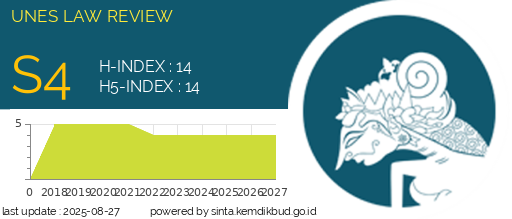LEGAL CERTAINTY ARTICLE 15 PARAGRAPH (3) LAW NUMBER 2 OF 2014 CONCERNING AMENDMENT TO LAW NUMBER 30 OF 2004 CONCERNING NOTARIES
DOI:
https://doi.org/10.31933/unesrev.v5i4.633Keywords:
Legal Certainty, Authority of a Notary, Article 15 Paragraph (3), Law on Notaries.Abstract
This study discusses the ambiguity of norms in Article 15 paragraph (3) of Law Number 2 of 2014 concerning Amendments to Law Number 30 of 2004 concerning Notaries (Amendments to the Notary Law) which affect legal certainty in the regulation of the authority of a notary related to "authority others regulated in the Legislation". This provision causes confusion regarding the scope and limits of a notary's authority in carrying out his duties. This study also analyzes the impact of the ambiguity of these norms on the implementation of the authority of a notary in legalizing electronic transactions. Through a normative legal research approach, the author analyzes the relevant articles in the Notary Law and related laws and regulations to understand the legal context related to the authority of a notary. This research finds that the ambiguity of norms in Article 15 paragraph (3) creates ambiguity regarding the limits and scope of a notary's authority in terms of "other authorities regulated in Laws and Regulations". The impact of the ambiguity of this norm can be seen in the implementation of the authority of a notary in legalizing electronic transactions. Without clarity regarding the scope of this authority, notaries may face difficulties in determining whether they have the authority to certify certain electronic transactions, which in turn can affect the legal certainty in such transactions. This study suggests the need for clarification of norms in Article 15 paragraph (3) of Law Number 2 of 2014 concerning Amendments to Law Number 30 of 2004 concerning Notaries. A clear clarification will provide clarity to notaries regarding the limits and scope of their authority in relation to "other authorities stipulated in Laws and Regulations", so as to increase legal certainty and the effectiveness of the implementation of notary powers in validating electronic transactions.
Downloads
References
Denny Fernaldi Chastra, 2021, “Kepastian Hukum Cyber Notary Dalam Kaidah Pembuatan Akta Autentik Oleh Notaris Berdasarkan Undang-Undang Jabatan Notaris”, Indonesian Notary, 3(2),.
Devi Alincia and Tundjung Herning Sitabuana, 2021, "Urgency of Law Amendment as Foundation of The Implementation of Cyber Notary". Law Reform, 17(2),
Fadhila Rizqi and Siti Nurul Intan Sari D., 2021, "Implementasi Cyber Notary Di Indonesia Ditinjau Dalam Upaya Reformasi Birokrasi Era 4.0" Jurnal Hukum dan Kenotariatan, 5(1).
I Putu Suwantara and Putu Angga Pratama Sukma, ‘Konsep Cyber Notary Dalam Menjamin Keautentikan Terhadap Transaksi Elektronik’ [2021] Acta Comitas, 6(1),.
Kadek Setiadewi and I Made Hendra Wijaya, 2020, "Legalitas Akta Notaris Berbasis Cyber Notary Sebagai Akta Otentik". Jurnal Komunikasi Hukum (JKH). 6(1).
Latifah Latifah, 2021, ‘Tanggung Jawab Notaris Dalam Pelanggaran Kode Etik Notaris". Jurnal Officium Notarium, 1(1),.
Syamsul Bahri, Annalisa Yahanan and Agus Trisaka, 2019, "Kewenangan Notaris Dalam Mensertifikasi Transaksi Elektronik Dalam Rangka Cyber Notary" Repertorium, 17(1).
Downloads
Published
How to Cite
Issue
Section
License
Hak cipta :
Penulis yang mempublikasikan manuskripnya di jurnal ini menyetujui ketentuan berikut:
- Hak cipta pada setiap artikel adalah milik penulis.
- Penulis mengakui bahwa UNES Law Review berhak menjadi yang pertama menerbitkan dengan lisensi Creative Commons Attribution 4.0 International (Attribution 4.0 International CC BY 4.0) .
- Penulis dapat mengirimkan artikel secara terpisah, mengatur distribusi non-eksklusif manuskrip yang telah diterbitkan dalam jurnal ini ke versi lain (misalnya, dikirim ke repositori institusi penulis, publikasi ke dalam buku, dll.), dengan mengakui bahwa manuskrip telah diterbitkan pertama kali di Jurnal UNES Law Review.



















